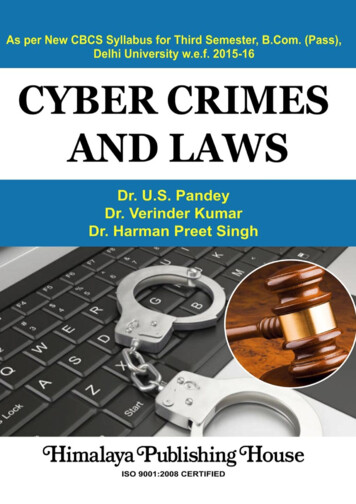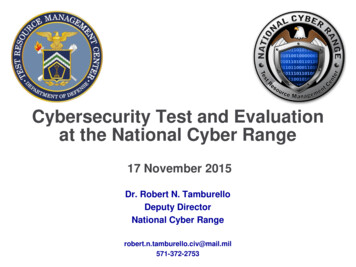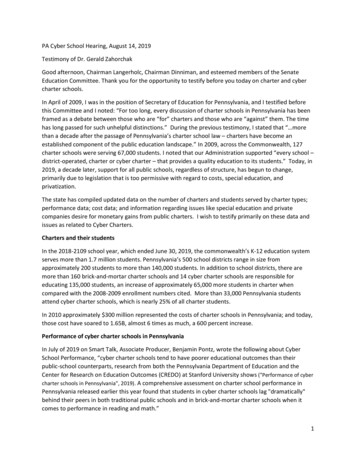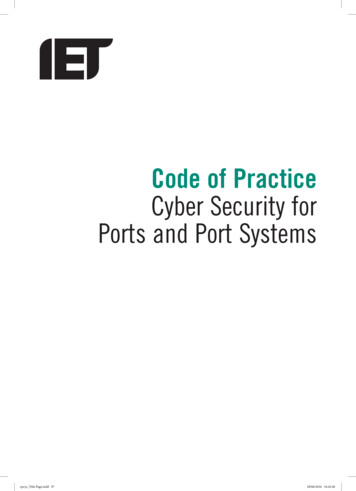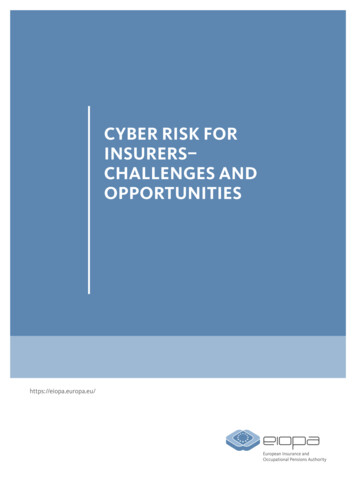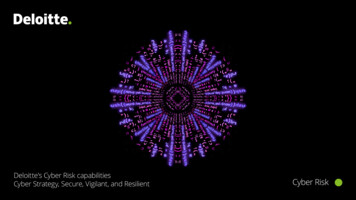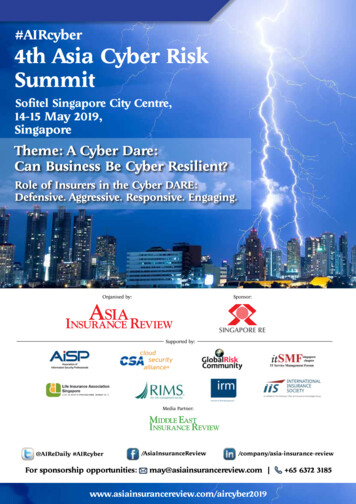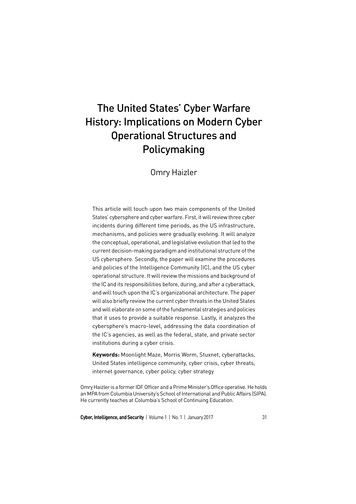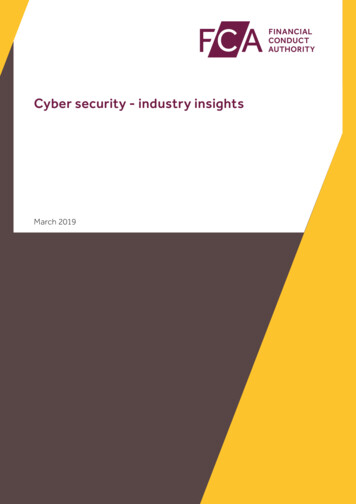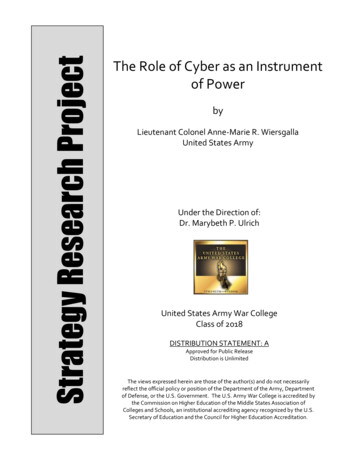
Transcription
Strategy Research ProjectThe Role of Cyber as an Instrumentof PowerbyLieutenant Colonel Anne-Marie R. WiersgallaUnited States ArmyUnder the Direction of:Dr. Marybeth P. UlrichUnited States Army War CollegeClass of 2018DISTRIBUTION STATEMENT: AApproved for Public ReleaseDistribution is UnlimitedThe views expressed herein are those of the author(s) and do not necessarilyreflect the official policy or position of the Department of the Army, Departmentof Defense, or the U.S. Government. The U.S. Army War College is accredited bythe Commission on Higher Education of the Middle States Association ofColleges and Schools, an institutional accrediting agency recognized by the U.S.Secretary of Education and the Council for Higher Education Accreditation .
REPORT DOCUMENTATION PAGEForm Approved--OMB No. 0704-0188The public reporting burden for this collection of information is estimated to average 1 hour per response, including the time for reviewing instructions, searching existing data sources, gathering andmaintaining the data needed, and completing and reviewing the collection of information. Send comments regarding this burden estimate or any other aspect of this collection of information, includingsuggestions for reducing the burden, to Department of Defense, Washington Headquarters Services, Directorate for Information Operations and Reports (0704-0188), 1215 Jefferson Davis Highway, Suite1204, Arlington, VA 22202-4302. Respondents should be aware that notwithstanding any other provision of law, no person shall be subject to any penalty for failing to comply with a collection of informationif it does not display a currently valid OMB control number. PLEASE DO NOT RETURN YOUR FORM TO THE ABOVE ADDRESS.1. REPORT DATE (DD-MM-YYYY)2. REPORT TYPE3. DATES COVERED (From - To)01-04-2018STRATEGY RESEARCH PROJECT.334. TITLE AND SUBTITLEThe Role of Cyber as an Instrument of Power5a. CONTRACT NUMBER5b. GRANT NUMBER5c. PROGRAM ELEMENT NUMBER6. AUTHOR(S)5d. PROJECT NUMBERLieutenant Colonel Anne-Marie R. WiersgallaUnited States Army5e. TASK NUMBER5f. WORK UNIT NUMBER7. PERFORMING ORGANIZATION NAME(S) AND ADDRESS(ES)8. PERFORMING ORGANIZATIONREPORT NUMBERDr. Marybeth P. Ulrich9. SPONSORING/MONITORING AGENCY NAME(S) AND ADDRESS(ES)10. SPONSOR/MONITOR'S ACRONYM(S)U.S. Army War College, 122 Forbes Avenue, Carlisle, PA 1701311. SPONSOR/MONITOR'S REPORTNUMBER(S)12. DISTRIBUTION / AVAILABILITY STATEMENTDistribution A: Approved for Public Release. Distribution is Unlimited.I understand this document will be included in a research database and available to the public. Author: 13. SUPPLEMENTARY NOTESWord Count: 706314. ABSTRACTCyberspace is a hyper-integrated borderless domain upon which the United States relies on for everythingfrom providing the basic elements of life to its citizens to ensuring free trade and global commerce. TheUnited States should develop a comprehensive whole of government cyberspace policy not only to elevatecyber power to a recognized instrument of national power, but also to establish a national-level cyberorganization to develop and apply a cogent, synchronized cyber strategy to take the lead in safeguardingthe cyber commons. This comprehensive approach is necessary in order to align and synchronizegovernment efforts and to secure American interests at home and abroad. In the 21st century national andinternational stability rely on a safe and secure cyber commons. The United States and other nationsrequire freedom of navigation within the cyber domain in order to maintain stability and to project power tosecure national interests and maintain national and international order.15. SUBJECT TERMSCyber Policy, Cyber Organization, Cyber Commons, National Interest16. SECURITY CLASSIFICATION OF:a. REPORTUUb. ABSTRACTUUc. THIS PAGEUU17. LIMITATIONOF ABSTRACT18. NUMBER OF PAGES3719a. NAME OF RESPONSIBLE PERSON19b. TELEPHONE NUMBER (w/ area code)UUStandard Form 298 (Rev. 8/98), Prescribed by ANSI Std. Z39.18
The Role of Cyber as an Instrument of Power(7063 words)AbstractCyberspace is a hyper-integrated borderless domain upon which the United Statesrelies on for everything from providing the basic elements of life to its citizens toensuring free trade and global commerce. The United States should develop acomprehensive whole of government cyberspace policy not only to elevate cyber powerto a recognized instrument of national power, but also to establish a national-level cyberorganization to develop and apply a cogent, synchronized cyber strategy to take thelead in safeguarding the cyber commons. This comprehensive approach is necessary inorder to align and synchronize government efforts and to secure American interests athome and abroad. In the 21st century national and international stability rely on a safeand secure cyber commons. The United States and other nations require freedom ofnavigation within the cyber domain in order to maintain stability and to project power tosecure national interests and maintain national and international order.
The Role of Cyber as an Instrument of PowerAn effective strategy is like a symphony performance resulting from the guidinghand of the maestro and the combined efforts of the musicians. The achievement ofnational interests requires an analogous combination of policy guidance and strategiesto combine all the instruments of national power. This paper explores how a morecoherent national cyber policy can contribute to the development of effective strategiesto better achieve U.S. interests. This paper argues that in the dynamic 21st centuryenvironment, where cyberspace permeates nearly every aspect of human existence,the United States should establish a policy to leverage cyberspace in the attainment ofnational interests. Such a policy would recognize cyber as an instrument of nationalpower, call for the establishment of a single cyber organization within the executivebranch, and embrace a U.S. global leadership role for safeguarding the cybercommons.This paper explores this idea in four parts. First, this paper examines thedefinitions of cyber, cyberspace, and cyber power, followed by a discussion of the roleof cyber power as an instrument of national power. Second, it discusses why a singleexecutive branch organization should lead and integrate cyber activities to attainnational interests. Third, it outlines the U.S. role in safeguarding the cyber commons. Itconcludes with a brief discussion of the application of cyber power in achieving U.S.interests. The purpose of this examination is to generate further discussion andilluminate a more relevant conception of the application of cyber power and cyberstrategy (see Figure 1).
Figure 1. Cyber Lines of EffortCyber, Cyberspace, and Cyber PowerTo frame the discussion, this paper first defines a few key terms: cyber,cyberspace, and cyber power. Defining these terms helps to develop an understandingof the nuances associated with cyber terminology. A common lexicon contributes todeveloping a clear conceptualization of cyber and assists with determining how differingconceptions shape the use of cyber at the individual, state, and international level.What Is CyberIn the modern age, we hear many words incorporating the terms cyber:cyberspace, cybersecurity, cyber-attack. Fans of “Doctor Who” are even familiar with“Cybermen.” But what is cyber and how does the word cyber differ from its use as amodifier in the words listed above? This paper will focus first on defining the termscyber, cyberspace, and cyber power. The Oxford and Cambridge English Dictionarieshave similar but not identical definitions of the term cyber. Using both definitions withslight modifications, this paper defines cyber as all those things involving computers,information technology (IT), virtual reality, and its relating culture.1 Cyber activitiesinclude the physical network, logical network, persona aspects, and cognitivedimension.2
CyberspaceThere are many definitions of cyberspace within the international community.These definitions help frame how nations consider cyberspace and therefore hasimplications for the development of cyber policies and strategies. 2 To help understandthe concept of cyberspace, we will look at several definitions from other nations andthen discuss how the United States currently defines cyberspace. The United Kingdomdefines cyberspace as encompassing “all forms of networked, digital activities; thisincludes the content of and actions conducted through digital networks.”3 The Canadiandefinition states that cyberspace is “the electronic world created by interconnectednetworks of information technology and the information on those networks.”4 Canada’sCyber Security Strategy goes on to say, “It is a global commons where more than 1.7billion people are linked together to exchange ideas, services, and friendship.”5 Australiaonce preferred the term Internet instead of cyberspace.6 But in 2016, Australia’s CyberSecurity Strategy transitioned to the term cyberspace.7The United States views cyberspace in a context closely related to its westernpartners. The 2009 U.S. Cyberspace Policy Review identified cyberspace as the“globally-interconnected digital information and communications infrastructure [that]underpins almost every facet of modern society.”8 Its common use refers tointeractions between people, the exchange of information, and virtual environments.9The U.S. Department of Defense (DoD) definition of cyberspace draws from thedefinition in the U.S. National Security Presidential Directive 54/Homeland SecurityPresidential Directive 23 (NSPD-54/HSPD23)10. According to Joint Publication (JP) 102, DOD Dictionary of Military and Associated Terms, cyberspace is “a global domainwithin the information environment consisting of the interdependent network of3
information technology infrastructures and resident data, including the Internet,telecommunications networks, computer systems, and embedded processors andcontrollers.”11 Although all of these definitions are useful in trying to understand exactlywhat cyberspace it, each of them has limitations.China and Russia do not use the term cyber, preferring the term“informationization.”12 This terminology difference indicates the variance in how Chinaand Russia view the man-made artificial domain the west calls cyberspace and how itconceptualizes and employs it. This variance in terminology highlights their focus on“information” and the digital world as a medium to pursue an information advantage vicethe more western view of the physical implications of cyberspace.13 Russia evenconsiders the threat of “information weapons” in some of its strategy documents.Understanding these views leads us to the realization that cyberspace is morethan a domain consisting of objects through which information flows. In the modern age,cyberspace is a pervasive environment that touches almost all aspects of humanexistence. Cyber activity is the interplay that occurs between the physical and logicalcomponents, the individual human being, and the cognitive sphere. It occurspredominantly in cyberspace but cyber activity can achieve effects outside cyberspace.It influences cognitive thought, how individuals and groups evolve, and how and wheresocieties form. It is a digitalized “living organism” in which billions of people work andplay.14 It is also a source of identity, wealth, and power.Cyber PowerCyberspace influences all aspects of the environment: individual, societal, geopolitical, and geo-economic, and cognitive. In ancient Greece, the politicianThemistocles stated: “He who controls the sea controls everything.”15 In the cyber age,4
it is arguable, that whoever controls cyberspace, can control the world. Therefore, cyberpower is the ability to control cyberspace. In 2009 the U.S. National Defense University(NDU) defined cyber power as “the ability to use cyberspace to create advantages andinfluence events in the other operational environments and across the instruments ofpower.”16 This definition, however, does not consider the implications of creating effectswithin cyberspace and how that might also garner power. Another definition is that cyberpower is the process of converting information into strategic effect.17 While cyber powerdoes not have a common definition, both cyber power definitions emphasize how theuse of cyber power can fulfill the ends of a strategy. It is not simply a medium forasserting power. In a digital world, where more than half of humanity is connected (andthe percentage increases every day), the individual, group, or state that can controlcyberspace possesses extraordinary power.18 This power is built through physical andlogical networks, perceptions, and intellect. Cyber power can attain national intereststhrough influence, control, and manipulation or through physical, social, and mentaldestruction. Cyber power is the ability to control cyberspace; more specifically, it is theability of a nation to secure and safeguard cyberspace, lend confidence to its citizens inthe security of that space, and project power through that space.19 It adds weight to astate’s diplomatic, economic, and military power.20Cyber as an Instrument of National PowerThe world has transitioned from the Information Age of the 1970s to the CyberAge of the 21st century. Within cyberspace, actors may wage wars, destroyinfrastructure, and convey messages to achieve an objective. Governments,businesses, transnational actors, and individuals all use cyberspace. It is more than justthe medium for utilizing the information instrument of power. Indeed, cyberspace5
transcends any one instrument of national power as seen in events such as Stuxnet,WannaCry, not Petya, intellectual property, and identity theft. For example, North Koreais relying increasingly on cyber power and views it as a low-cost and tailored instrumentof national power. North Korea is using cyberspace to produce income alongside itsdesired political, information, economic, and financial outcomes.21 This pervasive natureof cyberspace and its unique capabilities warrant consideration of cyber power’selevation and recognition as an instrument of national power.22 A more comprehensiveapproach would adapt the U.S. instrument of power lexicon mnemonic diplomacy,information, military, and economic to include cyber power as an equal instrument ofnational power; DIMEC or DIME-FILC.23 Such a designation would enable its moreeffective application in achieving national interests.24National PowerAccording to Joshua Goldstein, “Power is often defined as the ability to getanother actor to do what it would not otherwise have done, or not to do what it wouldhave done.”25 Additionally, Karen Mingst offers: “It is the ability to control outcomes thatwould not have occurred naturally.”26 National power is the sum of all resourcesavailable in the pursuit of an outcome and is derived from various “national” elementssuch as geography, resources, and population as well as “social” elements to includeeconomic, political, military, psychological, and informational. 27 Today both states andnon-state actors wield power. However, power exists only in relation to how a state ornon-state actor perceives such power. Power also depends on an actor’s ability to usesuch power to influence another actor to bend to its will. The instruments of nationalpower are a construct used to help conceptualize the resources a nation has available6
to achieve policy objectives.28 They assist policy-makers in developing strategies toachieve national interests within the international environment.The United States, and in particular the U.S. government, generally subscribes tothe idea that national power consists of four instruments: diplomacy, information,military, and economics, commonly referred to as DIME.29 Contemporary U.S. nationalsecurity policy thinking expanded the instruments of power to include Finance,Intelligence, and Law Enforcement, DIME-FIL.30 It is the effective integration andemployment of these instruments that determines the U.S. ability to achieve nationalstrategic objectives and advance U.S. interests.31 The military instrument of power canbe applied across the land, air, sea, space, and cyberspace domains. These domainsare environments through which the United States defends and projects military power.Currently, cyber power is viewed as a subcomponent of military power, employedat the President’s direction. Military power then integrates with other instruments ofnational power to advance and defend U.S. values, interests, and objectives. This leadsto a myopic approach to the application of cyber power through a military lens, asopposed to a more panoptic approach integrating the diverse aspects of cyber power.Cyber Power and the Instruments of National PowerUnlike land, sea, and air domains where power is applied through military force,the power diffusion and ease of access of achieving effects in the cyber domain extendit beyond a purely militarily application. State and non-state actors are using cyberpower as “a low-cost tool of statecraft” to achieve virtual and physical effects that impactfinance, commerce, politics, and society, and “to achieve strategic objectives.32 Themultitude of diverse effects contributes to cyber power’s influence. Therefore, themagnitude of cyberspace’s impact, and by extension cyber power, warrants additional7
consideration when discussing national interests and the application of the instrumentsof national power. This section compares cyber power with the other instruments ofnational power and contends that cyber power is on par with the military, economic, anddiplomatic instruments of national power.Carl Priechenfried argued that the changing character of conflict warrants themodification of the instruments of power.33 However, cyberspace is doing more than justchanging the character of conflict, it is changing the character of human existence. 21stcentury communities with limited access to the basic elements of life, such as water,healthcare, and reliable electricity, possess cell phones with internet access. Today,activities in cyberspace produce implications across the geo-political spectrum. TheDirector of National Intelligence, Daniel R. Coats, testified before Congress that,“adversaries and malign actors will use all instruments of national power—includinginformation and cyber means—to shape societies and markets, international rules andinstitutions, and international hotspots to their advantage.”34 Cyberspace affects how theUnited States and other actors conduct diplomacy, exchange information, employmilitary capabilities, and supports economic activities. These implications requireconsideration and synchronization when applying each of the instruments of power.(see figure 2).358
Figure 2. Cyber Is a Standalone Instrument of Power and Buttresses Each Instrument ofPowerCyber and DiplomacyDiplomacy is “the formation and execution of foreign policy on all levels, thehighest as well as the subordinate.”36 The U.S. House of Representatives passed TheCyber Diplomacy Act of 2017, which is currently under review by the Senate Committeeon Foreign Relations. This Act demonstrates the criticality of cyber activities to theUnited States. Its designation of an “Office of Cyber Issues” within the Department ofState (DOS), responsible for leading diplomatic cyberspace efforts highlights thesignificant role cyber plays in the international community.37 This Act calls for acongressionally mandated and Senate-confirmed position as the head of theDepartment of State Office of Cyber Issues and highlights the prominence cyberactivities play in world power politics.38Cyber and the MilitaryHistorically, the basis for a state’s power resided in its military strength. Today,however, the interdependencies associated with cyberspace extend its effects beyondsolely military applications. This is because the greatest threats in cyberspace span thespectrum of human activity. They are not solely from the military, but also emanate fromintelligence services, criminals, and hackers. The threats target not only governmentsand the military, but business, industry, and individuals as well.39 Governments shouldconsider these evolving threats, opportunities, and risks when discussing cyber as aninstrument of power in a whole of government discussion. The ability of states and nonstate actors to hold non-military entities as a “cyber hostage” generates its own uniqueform of power that can have both physical and psychological effects.9
Cyber and Economics.While hardly mentioned in National Security Strategy (NSS) documents prior to1987, economic security considerations have gained prominence.40 This transition toinclude an economic dimension in U.S. National Security Strategy recognized thechanged perceptions of national power over time. Increasing economicinterdependence led to the importance of economics as an instrument of nationalpower. Like American economic well-being, American cyber well-being is similarlyimportant. In the modern world, cyberspace underpins the economy and economic wellbeing. This is particularly the case as individuals, non-state actors, and even somestates are transitioning to economies that are reliant on cyberspace. Therefore, cyberpower, like a strong domestic economy, can produce soft-power within internationalpolitics.Cyber and InformationOf the four, information is the instrument of national power that has most recentlycome to the fore.41 Its addition to the national security lexicon demonstrates how theinstrument of power model changed with the advent of the Information Age. Its inclusionhighlighted the reliance on technology in employing the nation’s security strategy toachieve U.S. interests. While there is no universal definition of the informationinstrument of national power Drs. Dan Kuehl and Bob Nielson describe the informationinstrument as: “Use of information content and technology as strategic instruments toshape fundamental political, economic, military, and cultural forces on a long-term basisto affect the global behavior of governments, supra-governmental organizations, andsocieties to support national security.”4210
The DOD JP 1 discussion on the “informational” instrument of national powerfocuses predominantly on written and spoken messages, and images that communicateDOD intent.43 However, neither definition reflects the current significance cyberspaceplays in daily life or its criticality in the modern age to current human existence. Bothdefinitions reflect a time when information technology was predominantly a medium forthe transmission of messages. While the information instrument of power operates incyberspace, cyber power is not synonymous with the information instrument of power.The information instrument is ultimately about the conveyance of thoughts andideas and the ability to influence a person or group of persons. Like Diplomacy, theinformation instrument may be a source of soft-power. According to political scientistJoseph S. Nye, soft power is the ability to achieve preferred outcomes through co-optivemeans such as persuasion and attraction.44 Conversely, hard power uses coercion andpayment to attain desired outcomes.45 Cyber power can result in either soft power orhard power.As soft power, cyber power extends beyond the information instrument of powerand its use of words and ideas to convey messages. Cyber power influences not onlywhat we think but encroaches into how we think and the way we associate ourindividual identities and social constructs. Cyberspace may even be changing thestructure of the human brain.46 This makes the potential application of cyber power evenmore significant. The reliance on digital devices and connections, both physical andvirtual, is transforming society. Individuals are becoming dependent and even addictedto the digital world. Cyber power may also be wielded as hard power.11
As hard power, cyber power manifests through the manipulation, denial, ordestruction of physical devices or logical code creating an effect inside or outside thecyber domain.47 One example of the application of cyber power as hard power would beundermining trust in financial markets. Contemporary financial markets require trust inthe integrity of its networked systems. If an actor weakens that trust by casting doubt onthe integrity of these systems, this could cause disruption in market operations. Theresult would be severe financial impacts leading to an economic crisis and public panic.The Nature of Power in CyberspacePower is what people believe it is. The reputation for power, in other words,confers power on a nation-state regardless of whether that power is real or not.48 Thenature of power in cyberspace derives from its physical, virtual, and cognitive aspects.49Understanding this nature of cyber power is critical to understanding how to apply it.Cyberspace has sociological, cultural, economic, and political aspects. These profoundattributes of the nature of cyber power show that cyber power is more than theapplication of offensive and defensive capabilities by the military. As the NDU definitionstates, cyber can be about influencing behavior, but this influence extends beyond theDIME instruments of power. It is also about affecting, both physically and virtually, anenvironment so pervasive that it crosses territorial boundaries and creates andmaintains its own societies.Cyber is a virtual world that extends beyond the borders of sovereign nationstates, where individuals and groups create their own unique social groups andidentities. Cyberspace creates a world unto itself, where individuals live, virtual societiesdevelop, and those who can control this virtual world yield power. Cyberspace is indeed12
pervasive, and to apply cyber power requires an understanding of the nature of powerwithin it.Tim Jordan describes the nature of power in cyberspace as three intertwinedlevels: individual, social, and societal, each infused by a different type of power.50 Whilehis view is very constructivist in nature, his ideas on the nature of power in cyberspaceassist in understanding the application of cyber power and its recognition as aninstrument of national power.Jordan notes, first, that cyberspace is an individual tool. When considered assuch, cyber power appears as an individual possession, which then gives rise to issuessuch as cyber-politics, privacy, encryption, and censorship. Second, he identifiescyberspace as a social place, where communities exist. This is where cyber powermanifests as a technopower; those who can control and manipulate cyberspace and itsvirtual world and technologies have greater freedom of action.Regarding this form of cyber power, Jordan states that while cyberspace appearsto be an empowering medium to the individual, in reality, it is technologicallyempowered elites that dominate it. Finally, it is possible to consider cyberspace in termsof a society or digital nation. At that point, cyber power appears to the individual as ameans to a virtual life with similar commitments to groups and organizations as onewould recognize in the physical world.51The dynamic and pervasive nature of cyberspace and the existence of uniquesocieties within this space, outside of the territorial boundaries of sovereign nations, isan additional justification for its consideration as a separate instrument of power. In the21st century, he who wields power in cyberspace can very well control both the virtual13
and physical worlds. The evolution of the European Union (EU) illustrates how power iscontextual. This supranational regional organization developed through theconvergence of political and economic influences. The EU now transcends nation-stateterritorial sovereignty and national psychology. Cyberspace is developing asupranational dimension, as virtual organizations and societies develop and transcendgeographic boundaries. Violent extremist organizations are one example of such anentity. Cyberspace is no longer merely a medium for the utilization of the instruments ofnational power. It is a separate instrument which bears equal consideration whenprojecting national power to further U.S. interests.The routine interaction of the instruments of national power is fundamental toU.S. activities in the strategic security environment. The United States Government’s(USG) ability to achieve its national strategic objectives depends on employing theinstruments of national power in effective combinations and in all possible situationsfrom peace to war. The USG can use the cyber instrument of national power in differingapproaches that vary in purpose, size, scale, scope, risk, and intensity. Most cyberactivities occur below the threshold of armed conflict. Leaders must consider theemployment of cyber power in a complex, interconnected, and global environmentacross a continuum, ranging from cooperation to competition, to armed conflict. Todaythe careful integration of cyber power with other instruments of national power isnecessary to achieve U.S. objectives. A national-level, executive branch cyberorganization can align USG efforts in this regard.A National Level Cyber OrganizationThe National Security Council (NSC) plays a key role in the integration of allinstruments of national power, facilitating presidential direction, cooperation, and unity14
of effort. To accomplish this integration, the USG should establish a national level cyberorganization. The organization will interact with the other departments and agencies aswell as private industry to develop a mutual understanding of the capabilities,limitations, and consequences of cyber actions and to identify the ways in which cybercapabilities complement the application of the other instruments of national power.Furthermore, this organization would be responsible for the synchronization andintegration of all aspects of
Cyber Security Strategy goes on to say, "It is a global commons where more than 1.7 billion people are linked together to exchange ideas, services, and friendship."5 Australia once preferred the term Internet instead of cyberspace.6 But in 2016, Australia's Cyber Security Strategy transitioned to the term cyberspace.7


